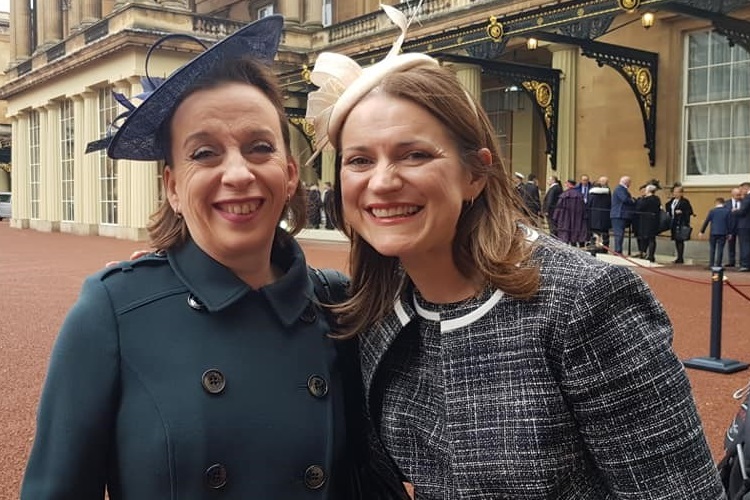St Andrews women honoured by the Queen

A leading international human rights expert from the University of St Andrews and a former Rector received their OBE awards from Prince William at a royal investiture ceremony at Buckingham Palace in London (Tuesday 26 November).
Professor Ali Watson, an expert in international relations and co-founder of the Third Generation Project, a human and community rights think-tank that focuses on the impacts of climate change on people and communities, is awarded an OBE, alongside Catherine Stihler, former Rector of the University. Catherine was the University’s 52nd Rector and only the second female to hold the prestigious position.
Professor Watson, who was educated at Powis (now St Machar) Academy in Aberdeen, followed by degrees from the Universities of Aberdeen, Glasgow and Dundee, is Managing Director and co-founder of the Third Generation Project, a think-tank based in the St Andrews School of International Relations dedicated to empowering communities impacted by climate change through research and informing and shaping policy agendas.
Her research focuses upon what happens when we look at the international system differently, and prioritise those not in power, rather than in power. This has included a long-term focus on the place of children and youth in global politics, where her work has been instrumental to the development of the field. This also extends to more recent work in North America and East Africa where she has been involved in documenting and examining both the nature of ongoing human rights violations of the private and public sectors against indigenous communities and the responses of these communities to them. This work has secured funding from the British Academy and National Geographic Society, amongst others, to do so.
This led to her co-founding the Third Generation Project which prioritises working with frontline communities to change the conversation around the human rights implications of the climate crisis to a more inclusive one that prioritises community-led solutions for academics, policymakers and practitioners. They are currently funded by National Geographic Society to develop, in conjunction with academics, community organisers, journalists and environmentalists in the UK, Germany, Somaliland and Kenya, educational multimedia materials on climate change to be used in Scottish classrooms.
Professor Watson said: “This recognition is truly a privilege, considering I see how so many colleagues in my field work so hard without receiving individual acknowledgement. So, while I am personally humbled, this award actually speaks to the work being done by so many, and of course to the strength of my family, a community that is not bound in blood but by a shared love.”
Catherine Stihler MEP has had a long-established relationship with the University which began when she was a student in St Andrews, later becoming President of the Students’ Association.
After receiving two degrees from St Andrews, Catherine proceeded to have a lengthy and successful career as a Member of the European Parliament (MEP), advocating for her constituents’ interests in Brussels. She was Vice-Chair of the European Parliament’s Internal Market and Consumer Protection Committee at the European Parliament. Catherine stepped down from her role as a MEP in January this year. Prior to stepping down, Catherine was one of 50 MEPs to sign a letter calling for the Article 50 Brexit deadline to be extended. She was also part of a group of Scottish politicians to take a case to the European Court of Justice to revoke Article 50.
In 2014 Catherine became Rector of the University of St Andrews, finishing her term of office in November 2017. During her time as Rector, Catherine’s notable achievements included the development of the Rectors’ Fund, providing financial support to students participating in internships. She has also been a committed and involved member of the University Court.
Following her resignation as a MEP, Catherine took up a role as the Chief Executive of global non-profit organisation Open Knowledge Foundation in February 2019.
Third Generation Project
The Third Generation Project is an international think tank based in Scotland providing research and advocacy in the areas of human rights and climate justice. With a fundamental belief that policy, practice and academia need to find a different path, we advocate for a people-centred, community-informed approach to the challenges that face all of us. The neoliberal project is broken.
Open Knowledge Foundation
Open Knowledge Foundation is a global non-profit organisation focused on realising open data’s value to society by helping civil society groups access and use data to take action on social problems.
Issued by the University of St Andrews Communications Office.